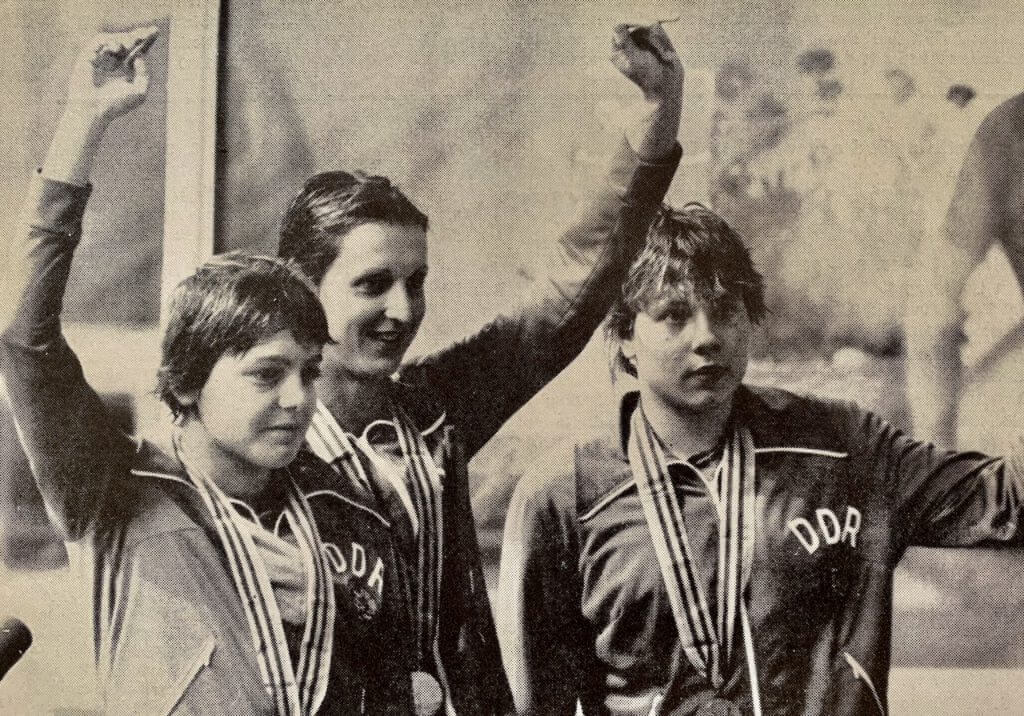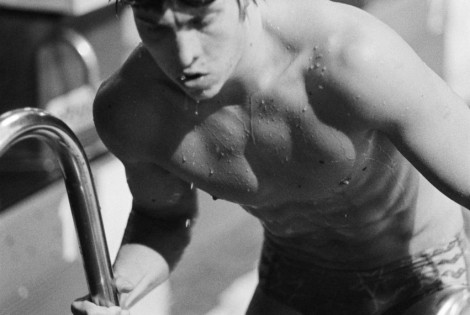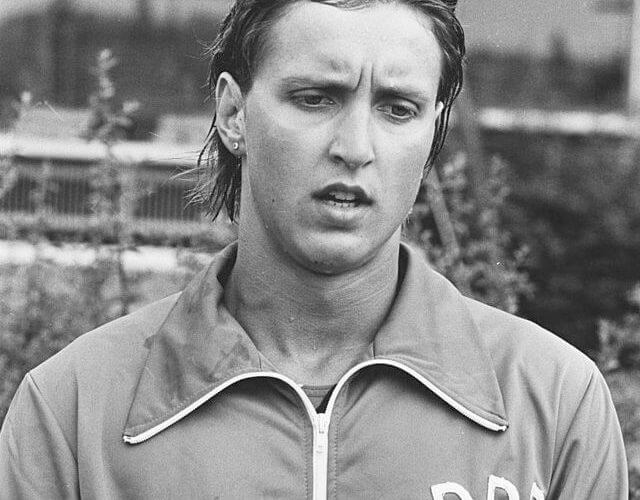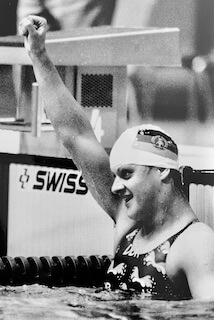Memories of Moscow 1980: 40 Years Since A Day Of DDR Sweeps & A Double For Salnikov At A Time Of Boycott & Doping

Today marks the 40th anniversary of the fifth day of racing in the pool at the Moscow 1980 Olympic Games, where Barbara Krause led one of two GDR podium sweeps on the day by adding the 200m freestyle title to gold in the 100m freestyle, all of that unfolding without Sippy Woodhead, who at 14 had stopped the East German medals machine by claiming the 200m freestyle World title in 1978 . The other women’s final was the butterfly, which featured three of Krause’s teammates whose stories are also key to the tale of systematic doping.
There was Gold No2 for Vladimir Salnikov, too, in a 400m freestyle final won in a time slower than the world record set by Canadian Peter Szmidt, who was barred from Moscow by boycott. Swimming World continues its 40th anniversary coverage of the events of Moscow 1980 and their impact on those who missed out and what the Moscow Games meant for those who made it, even, in some cases, when their Governments did not endorse their participation but their nations did.

Moscow 1980
Our Moscow 1980 Olympics coverage so far
- Memories of Moscow 1980: When Sweden’s Pär Arvidsson Led A Podium Of Historic Firsts Over 100m Butterfly
- Memories of Moscow 1980: 40 Years On, Mary T. Meagher Shares Memories of Olympic Boycott
- Memories of Moscow 1980: 40 Years To The Day Since Vladimir Salnikov Cracked 15-minute Barrier Over 1500m Free
- Memories Of Moscow 1980: How Duncan Goodhew Converted Olympic Gold To Victory In Life
- Memories of Moscow 1980: When Barbara Krause Took 100 Free Below 55sec 20 Years Before Her Day In Court With Kipke
- Memories of Moscow 1980 – When Sergei Fesenko Became The First Soviet Swimmer Among Men To Claim Olympic Gold
- Memories of Moscow 1980 – 40 Years Since Boycott Buried The Chances Of Cheryl Gibson & Maple Mates
- Moscow Olympic Flagbearers Max Metzker And Denise Boyd Linked Forever In Australia’s Proud Olympic History
- USOPC CEO Sarah Hirshland to 1980 Olympic Team: ‘You Deserved Better’
- The Moscow Boycott: A Toxic Mix of Sports and Politics Proved Costly for Hard-Working Athletes
On this day 40 years ago, Vladimir Salnikov, of the Soviet Union, added the 400m freestyle crown to his historic sub-15-minute victory over 1500m freestyle. If the men’s races were full of what ifs, day 5 of racing in Moscow produced two more podium sweeps for an East German women’s team fuelled by Oral Turinabol and the deception of State Plan 14:25, the extent and harm of which would only come to be known after the fall of the Berlin Wall in 1989.
Moscow 1980 – Day 5 Men’s Finals:

Vladimir Salnikov. Photo Courtesy: Dutch National Archives
Men 400m Freestyle – Athletes: 28; Nations: 16
- 3:51.31OR Vladimir Salnikov URS
- 3:53.24 Andrei Krylov URS
- 3:53.95 Ivar Stukolkin URS
3:54.15 Djan Madruga Garrido BRA
3:55.66 Daniel Machek CZE
3:56.83 Sandor Nagy HUN
3:56.87 Max Metzker AUS
3:57.00 Ron McKeon AUS
In the build-up to Moscow, Vladimir Salnikov, of the Soviet Union, broke the world record in the 400m three times. But on July 17, 1980, he lost the mark to Peter Szmidt, whose 3:50.49 at Canada’s alternative Olympic meet due to boycott made him only the third Canadian ever to hold the mark.
The first was George Hodgson, Olympic champion in 1912, the second Ralph Hutton, silver medallist at the 1968 Games in Mexico City, where performances in events of 200m or more were significantly affected by the city’s high altitude.
There would be no Olympic Games for Szmidt at his peak in 1980. He would make it to the Olympics, four years down the road at Los Angeles 1984, but in the third heat, he finished just behind West Germany’s new hope Thomas Fahrner on 3:55. Both missed the cut for the final. Szmidt did see Olympic-final action in his career; as a member of the Canadian 4x200m free quartet alongside Alex Baumann, Sandy Goss and Wayne Kelly when they finished fifth a little under 2sec from the podium sealed by Britain, the helm of the race a blistering battle between Germany, including Fahrner and Michael Gross, and the USA, which claimed gold by 0.04sec in a then World record of 7:15.69. A fine piece of history for Szmidt to have been a part of – but not the one that might have been.
When U.S. President Jimmy Carter made public his decision to enforce a boycott of the Moscow Games in protest at the Soviet invasion of Afghanistan, Salnikov was at a training camp in the United States. When Sergei Vaitsekhovsky, the coach leading the camp, was asked about the news, he responded with a fine spirit of sportsmanship, saying:
“The Americans surprised us by not keeping any of their training secrets from us, which means there must still be some decent people left in the world.”
In Moscow, with the likes of Szmidt and 1976 champion Brian Goodell (USA) out of the way, Salnikov, 22, made hay, first in the 1,500m and then the 400m. Some references have Salnikov winning the 400m before the 1,500m. However, the schedule shows a sequence of July 21 and 22 for the 1,500m heats and finals and this day 40 years ago, July 24, for the for the 400m heats and finals.
It was the 1,500m that granted Salnikov sporting immortality.
Two days after his epic, Salnikov set an Olympic record of 3:51.31 after racing almost even splits (1:55.55 and 1:55.76 – taking the dive into consideration, a negative split). That signed him up to the distance-double club with Taylor (1908), Hodgson (1912), Ross (1920), Rose (1956), Burton (1968) and Goddell (1976).

Barbara Krause – Photo Courtesy: Wikiwand
Moscow 1980 – Women 200m Freestyle – Athletes: 22; Nations: 14
- 1:58.33or Barbara Krause GDR
- 1:59.64 Ines Diers GDR
- 2:01.44 Carmela Schmidt GDR
2:02.29 Olga Klevakina URS
2:02.76 Reggie de Jong NED
2:03.15 June Croft GBR
2:03.74 Natalia Strunnikova URS
2:04.00 Irma Aksyonova URS
After Barbara Krause (GDR) had broken 1976 Olympic champion Kornelia Ender’s world record, in 1:59.04, in 1978, the standard was improved three times by Cynthia ‘Sippy’ Woodhead (USA), from 1:58.53 to 1:58.43 and 1:58.23.
The American was just 14 when she stopped the East German machine by winning the 200m freestyle World title at West Berlin ahead of Krause in 1978. The 1980 Olympics should and could have been a peak-performance moment of soaring excellence. In spring that year, she’d even set a World best time over 50m freestyle and was, at some point in the season, ranked No 1 in all distances from 50m to 800m.
Boycott over the Soviet invasion of Afghanistan blew away her hopes, dreams and everything she had worked so hard for. And the way was clear for Krause to dominate the event at the Games at the helm of an East German clean sweep. In the final, Ines Diers turned first in 58.60, Krause on 58.96 and Carmela Schmidt on 58.98. Krause then broke free of her teammates and swam a final 50m split of 28.47 on her way to setting an Olympic record of 1:58.33. The time would have won a medal at any of the next six Olympic Games, including gold in 1984.
There will be more on the impact of this race, the one below and the stories of the key protagonists as our series draws to a close over the weekend.

Caren Metschuk – Photo Courtesy: NT/CL-archive
Moscow 1980 Women 100m Butterfly – Athletes: 24 Nations: 18
- 1:00.42 Caren Metschuk GDR
- 1:00.90 Andrea Pollack GDR
- 1:01.44 Christiane Knacke GDR
1:02.21 Ann Osgerby GBR
1:02.40 Lisa Curry-Kenny AUS
1:02.61 Agneta Martensson SWE
1:02.89 Maria del Milagro CRC
1:02.90 Janet Osgerby GBR
Absent from the Games because of boycott was Mary T Meagher (USA), who in April 1980 had set a world record of 59.26.
All three medals in Moscow went to East Germans. In 1977, Christiane Knacke (GDR), then just 15, became the first woman to break the minute in the 100m butterfly, in 59.78. Twenty years later, only six nations boasted a national record faster, while the time would have made the Olympic final at any time until the 2000 Games in Sydney. But by the 1980 Games, Knacke was not the same athlete as she had been in 1977 when breaking through the minute barrier.
In 1978, she and 1976 400m and 800m Olympic champion Petra Thümer were called back from travelling to the World Championships in West Berlin after secret tests conducted at the IOC-accredited laboratory in Kreischa, Saxony, proved that she would test positive for elevated levels of testosterone. The laboratory was used by those in charge of State Plan 14:25 to ensure that no athlete who had been administered steroids would ever test positive, at least not officially. In swimming, the dark policy was successful throughout the years in which steroids were used to enhance performance in the GDR – 1973-1989. Knacke and Thuemer spent 137 days at a clinic near Dresden being “cleansed” of the drugs that had started to do them harm.
From 13, Knacke had been given Oral Turinabol pills by her coach Rolf Glaser as part of State Plan 14:25. She also received injections of cortisone and procaine, as well as other substances, some of which, it would later be revealed, had never undergone clinical tests, neither on animals nor humans. Knacke later recalled that she had put on 15kg in weight in one year leading up to her historic swim.
In 1998, Knacke faced some of her abusers in court during the German doping trials. Glaser was convicted of bodily harm to minors and apologised to his former charge. Many of the those who led State Plan 14:25, including the heads of Jenapharm (the pharmaceuticals company that produced Oral Turinabol), who sat in on many of the meetings when the plan was discussed and organised, were never called to account. Dr Lothar Kipke, former member of the FINA Medical Commission, was among those convicted. He holds yet a FINA honour for services to swimming despite all that came to pass.
The 1980 champion in the 100m butterfly, Caren Metschuck, went on to become a coach and in 2008 could be found on deck at Rostock swim club, training base of Thomas Rupprath.
Ann Osgerby (GBR) led those robbed of a place on the podium by swimmers whose performances had been enhanced pharmaceutically. Ann was born 20 minutes before her twin Janet – and finished 0.69sec ahead of her sibling in the final in Moscow.
Guardians of swimming have long shrugged when it comes to responding to measures that would recognise those swimmers who had not just medals but lifelong status stolen from them by systematic doping. Many of those deprived call yet for their rightful rewards to be handed to them.
In the early 1990s, Knacke and former GDR teammate Renate Vogel made an appointment to see Juan Samaranch, the then President of the International Olympic Committee. They took their medals with them and placed them on his table. They asked for the prizes to be given to their rightful owners. Years later, they told this author at a reunion of GDR swimmers that he had pushed the medals back at them and said “Keep them: you were not the only ones”.
Advertising: Shop At Swim360




You can’t help but wonder exactly what fantastic times Woodhead WOULD have swum if she had been fully prepared for Moscow. No doubt a 1:57 200 free.
Nuala Muir-Cochrane interesting x